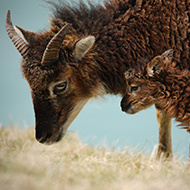'Breakthrough' vaccine vehicle for sheep and goats

"Our major advance is that we will be able to immunise sheep against a wide range of pathogens using a harmless organism they naturally harbour."
A 'breakthrough' vehicle to deliver vaccines to sheep and goats is being developed by Roslin Technologies in collaboration with the University of Edinburgh.
Incorporating technology generated from a harmless single-cell parasite, the vehicle can be manipulated by scientists to host proteins for an array of diseases, whether transmitted via a virus, bacterium or parasite.
Researchers are initially working on a vaccine to tackle peste des petits ruminants virus (PPRV), a highly infectious disease that threatens 80 per cent of the global sheep and goat population.
As the vehicle is quick and easy to engineer, researchers hope it will also be easy to target the emergence of any strain variations.
Dr Karen Fairlie-Clarke from Roslin Technologies said: “With such huge potential, we are eager to gather together partners who can deploy this technology to improve vaccine performance and increase the number of pathogens that can be targeted.”
The project is based around the trypanosomes melophagium parasite, isolated by scientists on the remote Scottish island of St Kilda. Trypanosomes are spread by sheep keds – a wingless insect — and are usually absent in the UK’s 16 million farmed sheep, which tend to be dipped to eliminate such infestations.
Prof. Keith Matthews from the University of Edinburgh's School of Biological Sciences, commented: “Our major advance is that we will be able to immunise sheep against a wide range of pathogens using a harmless organism that they naturally harbour."
The project forms part of Roslin Technologies’ mission to develop the science of sustainable protein, helping to make the food chain more efficient and to increase animal health and welfare.
Researchers say the potency of the vehicle and its ability to sustain immunity long-term will be particularly useful to farmers in remote areas or developing countries.



 The Federation of Independent Veterinary Practices (FIVP) has announced a third season of its podcast, Practice Matters.
The Federation of Independent Veterinary Practices (FIVP) has announced a third season of its podcast, Practice Matters.